Open Access Supports for Researchers in Canadian Universities: The Session Blog
July 9, 2:30 PM – Sauder Industries Room 2270
Presenters
Devon Greyson, Information Specialist with the UBC Centre for Health Services and Policy Research
Donald Taylor, Electronic Resources Librarian at Simon Fraser University
Background
The presentation provided an overview of a recently completed, quantitative study on the compliance of Canadian University libraries, as well as their concomitant research offices, with legislated funder mandates. Canadian research projects must provide open access versions of their findings as a condition of receiving financial support. The two presenters, Devon Greyson and Donald Taylor, outline the model used to determine relationships amongst all relevant parties, the guiding research questions, their methodology, the results and areas that require more investigation.
Session Overview
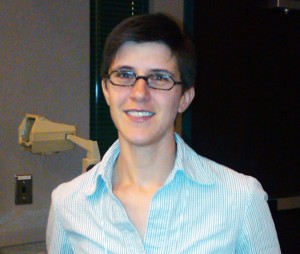
Devon Grayson at the PKP Conference (with permission)
Devon Greyson began the presentation by providing an overview of the study, which will be available through open access, on funding mandate compliance. Essentially this was a group project that created a common conceptual model of how research works in Canadian universities.
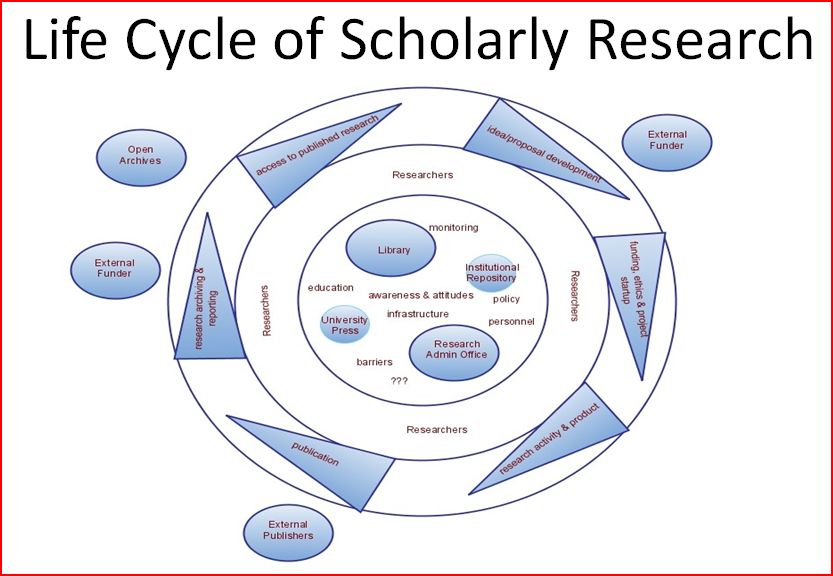 Scholarly Research Cycle (posted with permission of authors)
Scholarly Research Cycle (posted with permission of authors)
Open access has changed this research model, particularly because of Open Access Mandates instituted by Canadian research funders. The CIHR (Canadian Institute of Health Research) requires open access to peer reviewed articles within 6 months of publication, which places significant “impetus on the researcher” to publish results on line, or else funding will be curtailed. Similar policies in other Canadian organisations in the health sector, such as the Genome Project, are in place.
The Study’s Methodology
The study focussed on Canadian universities as a whole, which was represented by the libraries and research offices of each institution. The researchers used to following questions to guide their study:
(1) Are the various research agencies aware of open access funding mandates?
(2) Do they view the mandates as part of their purview?
(3) What is the extent of coordination between the libraries and research offices at each university?
Although there have been similar studies before, the survey questions used did not suit the Canadian context. Consequently new questions were drafted that applied to the research model above. The study concerned itself only with members of the Canadian Association of Research Libraries (CARL) and separate surveys were given to the respective libraries and research offices involved.
Donald Taylor pic
Overview of the Results
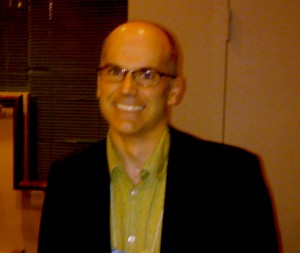
Donald Taylor at the PKP Conference (with permission)
Donald Taylor continued the presentation by reviewing the preliminary results. Surprisingly, only forty eight percent of research administration offices returned surveys, but sixty seven percent of libraries responded. Only thirty seven percent of the universities involved completed both surveys.
Sense of Mandate (posted with permission of authors)
Activity (posted with permission of authors)
Awareness (posted with permission of authors)
The three slides above illustrate that libraries are far more aware of the open access funder mandates than their counterparts. All of the libraries are aware of the mandates, compared to seventy eight percent of research offices. It is clear that libraries have a clearer understanding of their mandate to provide broad education on open access issues, whereas research offices recorded low numbers across the spectrum of questions. Furthermore, libraries were far more willing to engage in open access related activities or plan future endeavours than their research offices. Lastly, sixty percent of universities and research departments were aware of the other’s activity.
Conclusions
The results and responses tend to paint a picture of a lack of coordination and collaboration between two parties, with a few exceptions (some universities planned to include cooperation with other departments). It is also clear that there is an awareness lag between librarians and research administrators. It would seem that the two divisions have different views of their roles with regards to the mandates.
Follow-up Questions
(1) Is there overall compliance with mandates?
(2) Do authors want to participate in OA activities?
(3) How do we change the attitudes of researchers?
Analysis
This study illustrates that there is a distinct lack of understanding and cooperation on behalf of research offices to comply with legislated funding mandates, which explains Geist’s assertion that many universities are agonisingly slow to adopt open access initiatives (2007). These mandates have been instituted to ensure that researchers self archive their work and make it freely available in the associated institutional repository, which benefits the research community as a whole. It would seem that some research is being stalled as a result of a lack of compliance and that many journal publications resent having their economic domains infringed upon.
Related Links
Devon Greyson articles on Scientific Commons
Donald Taylor articles on Scientific Commons
Developments in Canadian Funding Mandates for OA
References
Geist, M. (2007). Push for open access to research . BBC News, Retrieved July 9, 2009, from http://news.bbc.co.uk/2/hi/technology/6404429.stm
July 13, 2009 Comments Off on Open Access Supports for Researchers in Canadian Universities: The Session Blog
On Library Publishing and the Open Humanities Press: A Panel Presentation by the UCLA Library and the University of Michigan Library’s Scholarly Publishing Office: The Session Blog
July 9, 9:30 AM – Fletcher Challenge Room 1900
Presenters:
Marta Brunner, Librarian for English and American Literature and Comparative Literature at the Charles E. Young Research Library at UCLA
Shana Kimball, Publications Manager in the Scholarly Publishing Office (SPO) at the University of Michigan Library
Archived Video Stream of Session
Background
This session provided the library perspective as a follow up to the previous discussion on the Open Humanities Press (OHP) and its involvement with digital monographs, or “liquid books” (Hall). UCLA is working in partnership with the Open Humanities Press to fulfil a number of open access ideals, while the University of Michigan Library is working specifically to produce and distribute many of the works housed by the OHP online.
Session Overview
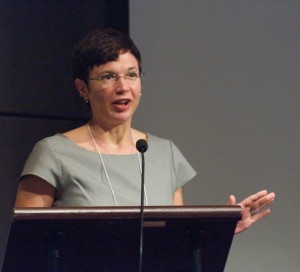
Marta Brunner at the PKP Conference (courtesy J. Miller)
Marta Brunner began the second half of the Open Humanities session by explaining her involvement with the online press. Originally she blogged the OHP and its endeavours prior to being contacted by one its founders, Sigi Jöttkandt, to be part of the body’s steering committee. Brunner has used her association with the OHP to bridge the dichotomous divide between research and library domains, which UCLA library has found to be an enormous asset.
“What future is UCLA library working to achieve?” Brunner asserted that this overarching question is the underlying motivation for the university’s work with the OHP. Furthermore, in light of the financial crisis and reduced budgets, open access issues are at a “watershed moment” where scholars and librarians will be working together to make more research freely available online. Brunner then outlined the library’s six fold vision, which ranges in order from most to least achievable:
1. UCLA seeks to be a flourishing hub of institutional repositories. While this is gaining ground many professors are still distrustful of online sources and perceive them to lack the same credibility as their print counterparts.
2. The library envisions itself as a curator of scholarly records. While this is considered a mandate for most university libraries, the “costs of migration” mean that “much content is overlooked” (Brunner).
3. UCLA hopes to disseminate an increasing amount of new digital media, which “enables semantically enhanced” (Brunner) products. The library has not been able to fulfil this goal on a large scale, but has created digital maps through the Hypercities project.
4. The library anticipates playing a greater role in providing open access content in classrooms. The UCLA library uses “a more liberal policy” (Brunner) towards content, which aligns neatly with the ideals of the OHP. One of the main benefits of this institutional leniency will be the increasing availability of cheaper text books spawned from more widely recognised open access scholarship.
5. The UCLA library hopes to be a paragon of a sustainable business model for housing and distributing open access content. Brunner used the comparison of the cost of a Toyota Corolla and the journal “Applied Polymer Science”: The periodical costs considerably more. Consequently, libraries will be facing economic crises as budgets are cut and journal costs stay high.
6. The most difficult goal to attain will be reducing to restrictive nature of academic tenure on open access scholarship. The generally perceived lack of authority of online sources continues to hinder the open access movement.
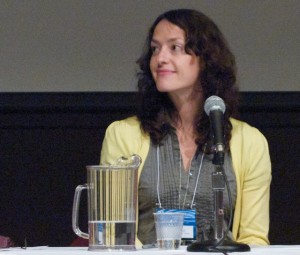
Shana Kimball at the PKP Conference (Courtesy J. Miller)
Shana Kimball began by posing a different question: “How do we scale a liquid book?” The University of Michigan Scholarly Publishing Office (SPO) seeks to provide an answer for this important query. Kimball outlined the role of the publishing branch of the library bOpen Humanities Press Panelefore explaining its core principles. The speaker then elaborated upon how these values guide the publisher’s work towards making research publications more cost effective, as well as elucidating on its partnership with the Open Humanities Press.
The University of Michigan publishing branch currently supports forty predominantly open access online journals, as well as a few print publications. The organisation also runs a “robust” reprint service for its online repositories and has published over 9000 titles on Amazon. Additionally, the SPO is working with the OHP to develop its online monograph (single subject books) endeavour as part of a pilot project whereby the university will “convert, host, provide access to, and archive” the series.
The University of Michigan Scholarly Publishing Office also operates with a set of six main beliefs to guide its aim of making scholarly publishing “more sustainable and scalable” (Kimball):
1. The SPO works at the peripheries of mainstream library services by providing copyright counsel in the copyright arena, cataloguing metadata, maintaining digital library functions and financing complicated transactions.
2. The SPO forms partnerships with other organisations to provide supplementary services, such as content sharing or publication conversions into digital forms amongst other enterprises.
3. The SPO believes strongly in protecting the rights of authors to use their own material as they see fit.
4. The SPO takes small, calculated risks that focus on perpetuating and promoting experimental texts, such as producing scholarly works within Comment Press that can be freely annotated.
5. The SPO provides a myriad of services that range from electronic publication to print on demand to content preservation.
6. The SPO is working cooperatively with the Open Humanities Press to extend its number of published series, as well as further enhance its reputation for high quality academic work. Authors will be able to choose to use a creative commons license while retaining copyright protection.
Ultimately, the SPO cannot attain the goal of supporting the OHP without creating partnerships with other bodies. Furthermore, the task of producing single monograph publications is a daunting one because the library / publisher relationship has been traditionally weak. Kimball concluded her presentation by welcoming interested parties to inquire about future collaborative endeavours and reaffirmed her organisation’s commitment to building the reputation of open access content, as well as being an agent of change in the advancement of the Open Humanities Press’ ideals.
Analysis
Both the UCLA Library and the University of Michigan Scholarly Publishing Office acknowledge to importance of the Open Humanities Press and seek to propagate its principles to the wider academic community. However, achieving change and gaining acknowledgment is proving to be difficult due to general academic distrust, high operational costs, a system of reputation based incentives that favour established scholars, as well as an overwhelming amount of content through which to sort. The goals of the OHP are laudable, but there needs to be an economic compromise between open dissemination of information at no cost to the consumer and providing profitable rewards to creators, researchers or artists in order to perpetuate the transmission of knowledge. The University of Michigan SPO appears to be negotiating this difficult dialectic by working with open access supporters, while charging for unique services and publishing traditional print journals, which is referred to as the mixed approach (Schmidt et al., 2005). The UCLA library, on the other hand, is focussing on reducing costs by embracing predominantly open access works. It will be interesting to see which institution offers the more sustainable business model and if other libraries will adopt these new paradigms. Moreover, it illustrates that the new open access ethos is having to coexist with traditional print resources until an alternative, yet effective, system of rewards can be established.
Related Links
University of Michigan Scholarly Publishing Office
References
Albert, K. M. (2006). Open access: implications for scholarly publishing and medical libraries. J Med Libr Assoc, 94 (3), Retrieved July 9, 2009, from http://www.pubmedcentral.nih.gov/picrender.fcgi?artid=1525322&blobtype=pdf
Antelman, K. (2004). Do open-access articles have a greater research impact?. College & Research Libraries, September, Retrieved July 9, 2009, from http://www.ala.org/ala/mgrps/divs/acrl/publications/crljournal/2004/sep/antelman.pdf
Schmidt, K. D., Sennyey, P., & Carstens, T. V. (2005). New roles for a changing environment: Implications of open access for libraries. College & Research Libraries, September, Retrieved July 9, 2009, from http://paws.wcu.edu/kschmidt/publications/CandRL.pdf
July 12, 2009 Comments Off on On Library Publishing and the Open Humanities Press: A Panel Presentation by the UCLA Library and the University of Michigan Library’s Scholarly Publishing Office: The Session Blog